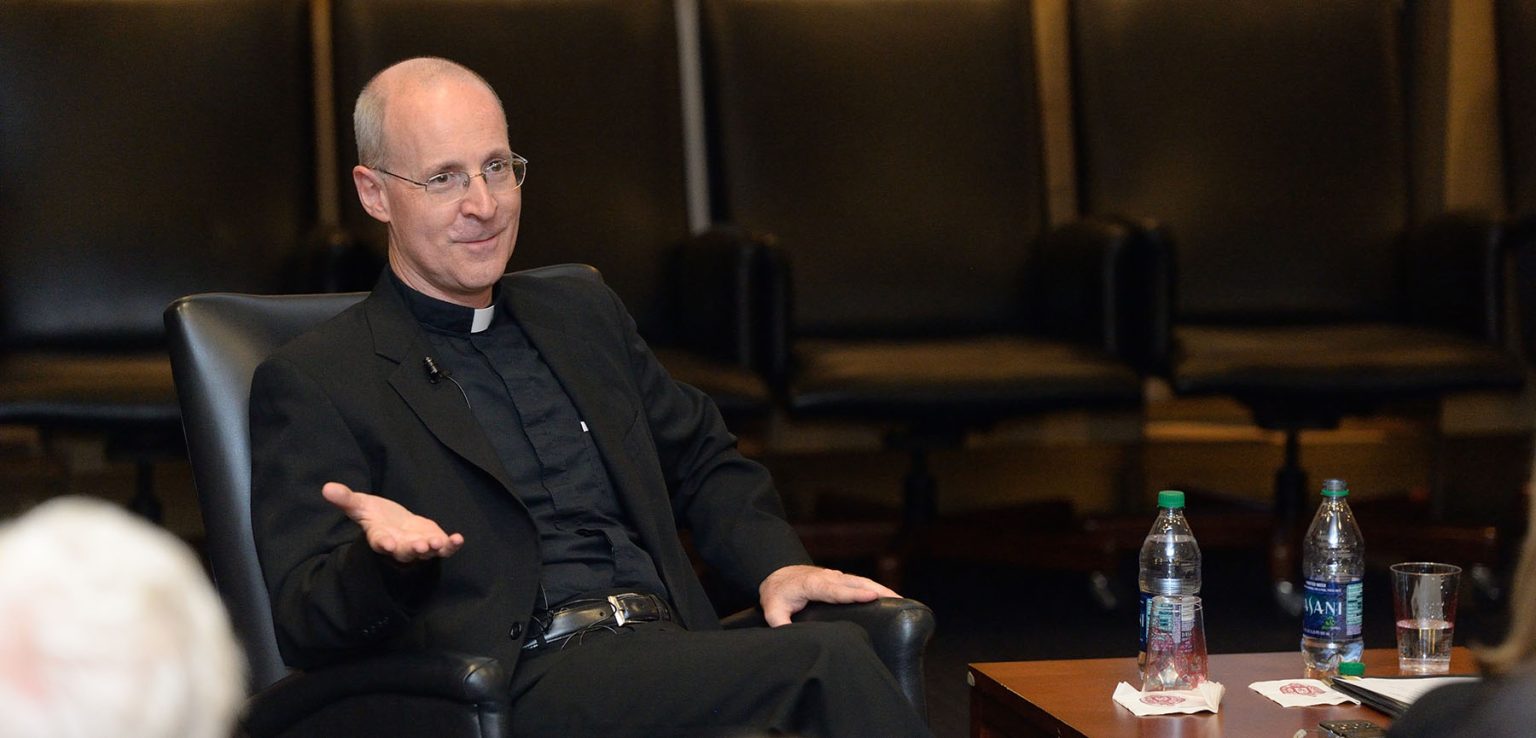From the get-go, an Oct. 6 discussion at Fordham on the recent papal visit to America delved into one of the more controversial aspects of the groundbreaking event.
In “Pope Francis Goes to Washington… and Philadelphia… and New York,” theology professor Patrick Hornbeck, PhD, asked author James Martin, SJ, to weigh in on Pope Francis’ meeting with Kim Davis, the county clerk who refused to issue same sex marriage licenses.
“I was really upset,” said Father Martin, sitting in front of a split-screen image of the pope and Davis. “It made it difficult for people to reflect on the visit.”
Father Martin refused to join the growing chorus of blame aimed at Archbishop Carlo Maria Viganò, the Apostolic Nuncio to the United States who is reported to have permitted the encounter in the Washington D.C. Vatican mission. However, he criticized Davis’ lawyer, Mat Staver, for turning a private meeting into a “publicity stunt.”
“That’s the thing I found very craven,” he said.
The Davis distraction shifted the focus from other issues and from the pope’s values, which Father Martin said were on display from the moment he got into his tiny Fiat at the airport and not a limousine.
A frequent guest commentator in the media, Father Martin was on hand to do commentary for TV during the pope’s speech to the U.S. Congress. He said he received an embargoed copy of the papal speech, and was moved by what he found.
“It was four words: Dorothy Day, Thomas Merton,” he said. “I started to cry when I saw their names.”
Catholic Church hierarchy, he said, had shabbily treated the two. He noted that Francis Joseph Cardinal Spellman once told Dorothy Day that she couldn’t use the word “Catholic” in her Catholic Worker organization. And the U.S. Conference of Catholic Bishops had excised the writings of Thomas Merton from the Adult Catechism, he said.
“I was moved to see these two people raised up and rehabilitated in front of Congress and the whole country,” he said. “He reminded us of our heritage by saying, ‘Look at who you are and look at who you can be,’” said Father Martin.
Pope Francis showed up at Fordham tonight, wearing his Fordham gear. He told me to tell everyone, “Don’t forget to pray for me…And go Rams!” #Repost @mtrer @jamesmartinsj says hi, @jakebraith and Jonathan! #Fordham4Francis #jesuiteducated #blessed A photo posted by James Martin SJ (@jamesmartinsj) on
He said that church leadership here in the United States generally fell in to three camps: the group that supported the pope from the beginning, a group that doesn’t understand him but is open minded, and a third group that does not care for his message.
“The buzzword among Catholic critics is that he’s ‘confusing’ people,” he said. “But whenever you have a new boss in any organization it takes a while to get used to them, so for the some of the [resistant]bishops you can’t blame them.”
Father Martin noted that Pope John Paul II and Pope Benedict appointed many of the bishops. They were encouraged to administer in a certain way, so its not surprising that they would chafe at new directives, he said.
However, now that many had met the pope in person during his visit, a new trust might develop.
Even though there was a “shocking lack of women in his visit,” Father Martin said the pope went out of his way to praise women religious.
“Women may not have been present on the altar, but they were certainly present in his mind.”
Hornbeck also shared a series of projected images that prompted a variety of responses from Father Martin, including an image of an inmate’s tattooed hand shaking the pope’s hand.
“Saints are real people,” he said. “I think we have a saint alive and among us. He has an unerring pastoral sense, because he’s been a pastor. You can’t fake that stuff.”
The event was sponsored by the Department of Theology.

